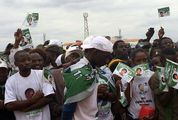Source:

BUSINESS DAY TV: China’s economy not headed for hard landing
by Transcript service,
2015-10-20 11:53:52.0
Investec Asset Management strategist Michael Power speaks to BDTV about China’s third-quarter growth of 6.9%, which beat expectations but is still the lowest since the global financial crisis
BUSINESS DAY TV: Like clockwork, China’s Statistics Bureau has produced GDP numbers for the third quarter, showing growth of 6.9%. It’s the slowest quarterly growth rate since the first quarter of 2009 but exactly in line with its politician’s targets of around 7% for the full year. Joining me now on the line is Michael Power, strategist at Investec Asset Management.
Michael suspending all scepticism and taking the numbers at face value, do these numbers indicate a hard landing for China’s economy, or in fact quite the opposite?
MICHAEL POWER: Not a hard landing, something of the opposite. What they indicate more than that though is the fact that the shape of China’s economy is starting to change rather rapidly and people who were fixated with looking at the old metrics measured performance of the Chinese economy and ignoring the new metrics which are more consumer oriented and less producer oriented, are missing the point that China’s...this particular leopard is changing its spots.
BDTV: Yes I imagine you’re referring there to services sector growth which was 8.6%, industrial output was 5.8%, so on that metric are these actually pretty strong numbers?
MP: I think they’re just solid numbers...what we’re seeing is the rate of slowdown of growth, and remember we’re still talking about the second largest economy in the world now, has started to decline. It looks as if there’s a degree of stability coming into the numbers, though it’s too early to be precise in that regard. But those people have been saying you need to try and understand that China is changing and don’t overly focus on the industrial side of the economy...spend more time looking at the consumer side of the economy if you want to get a proper picture of what’s happening, they’d be vindicated.
BDTV: And do you trust the numbers as far as one can trust numbers that are produced very quickly and faster than other economies?
MP: What you must trust is the rate of change rather than the precise numbers that end up coming out, and the point that we’re getting here is that China is not falling in a heap in the way that some people said it would, and usually those people as I say who were looking at old economy metrics.
BDTV: Okay, there is some expectation that the People’s Bank of China will have to cut rates again this year. Do you think that’s actually necessary if you look at the detail within these GDP figures?
MP: One has to remember that the cutting of rates now becomes a different proposition, if as we now have the consumption side of the economy is accountable for more than 50% of the growth of the production side of the economy is accountable for less than 50%. So you have to think of the effects of the cutting of rates, more on the consumer than the producer now and that’s something which I think is a little bit more complicated. Generally speaking, consumers are more sensitive to rate cuts or rises than producers because producers are often in the case of China, producing for an external market, whereas the consumers are essentially wholly contained within in the internal. And so that the whole dynamic of when rates get cut and why they get cut is going to change along with the state of the Chinese economy. And in that regard, to try and give an answer to your question, I don’t think the necessity to cut rates is as great as it might have been if the economy were still more old than new.
BDTV: Yes, and presumably on that basis too, if China’s economy has moved in favour of a consumer and services oriented economy it might actually be quite damaging to devalue the yuan further from this point.
MP: I didn’t even think that they’d really devalued the yuan in the first instance. I believe it was much more of an adjustment that was required as part and parcel of getting ready for the yuan to be part of the global OCR (official cash rate) basket. A 2.6% move in the currency look in the case of SA is something that can happen quite easily on a daily basis. So I think people have over analysed exactly what happened, or at least fitted what happened to their own particular prejudices and in the case of China, it was much more a case of the ship of China was launched out of the slipway and created a little bit of splash when it hit the water, but to call it a devaluation is too strong.
BDTV: In that case, you are sounding very sanguine about the Chinese economy and there was an opinion piece in today’s Financial Times saying, “China-Brazil link is top threat to global economy”. They talk about Chinzilla...do you think that is totally overstated then, given what we’ve just discussed?
MP: Not totally overstated, but what’s happened is that there’s been a massive terms of trades shift from the likes of SA, Brazil, any commodity producer to China and I think that China in a way has had the downside softened by this massive shift in its sabre...the fact that the products that it’s importing have become so much cheaper have probably meant that its current account surpluses is wider than it would have otherwise have been, and a wider current account surplus contributes to stronger growth. So the point that they’re making — and it’s a valid point — is that Brazil will be one of the largest detractors from global growth in the current year, interestingly although it’s hardly ever mentioned, so too will the European Union and that’s largely due to the currency effect on the size of their dollar economy.
BDTV: But they also talk about the “danger of the renminbi depreciation unleashing deflation worldwide”.
MP: I don’t think that the Chinese are going to allow for much of a depreciation of their currency and it really hasn’t moved that much, all things considered, especially when one sets it against what other countries have. Over the course of this year the euro has depreciated some 2.5 to three times more than the renminbi has, and how many people are standing up and saying, oh my gosh, look at the euro depreciation. No, I think that 2.5% in a broad theme of things is really not that much. So I don’t think the Chinese are keen to play the game of devaluation and deflation. They’re very well aware of the effects, but that’s not their style.
BDTV: Just one last question, and understanding that you’ve come back from a trip in Latin America, how solid or shaky do you find some of the economies there that you visited?
MP: As a general rule, the three that I was in — Mexico, which is not so commodity oriented and Peru and Colombia which are more commodity oriented — are probably amongst the better positioned within Latin America. Brazil obviously is not well positioned and Chile is probably in the same category as Peru and Colombia, reasonably well run. Yes, they are affected by the fall in commodity prices but the fact that they have for instance deep pension markets have acted as an automatic stabiliser for them and all things considered, they’re not in too bad a position. I believe they’ve learned a few lessons as to...about the hubris of the commodity super cycle, but life goes on and I wasn’t actually that depressed from coming away and speaking to many of the leading institutional investors.
BDTV: I certainly don’t feel that depressed chatting to you this evening...thanks so much for your time.
Investec Asset Management strategist Michael Power speaks to BDTV about China’s third-quarter growth of 6.9%, which beat expectations but is still the lowest since the global financial crisis
BUSINESS DAY TV: Like clockwork, China’s Statistics Bureau has produced GDP numbers for the third quarter, showing growth of 6.9%. It’s the slowest quarterly growth rate since the first quarter of 2009 but exactly in line with its politician’s targets of around 7% for the full year. Joining me now on the line is Michael Power, strategist at Investec Asset Management.
Michael suspending all scepticism and taking the numbers at face value, do these numbers indicate a hard landing for China’s economy, or in fact quite the opposite?
MICHAEL POWER: Not a hard landing, something of the opposite. What they indicate more than that though is the fact that the shape of China’s economy is starting to change rather rapidly and people who were fixated with looking at the old metrics measured performance of the Chinese economy and ignoring the new metrics which are more consumer oriented and less producer oriented, are missing the point that China’s...this particular leopard is changing its spots.
BDTV: Yes I imagine you’re referring there to services sector growth which was 8.6%, industrial output was 5.8%, so on that metric are these actually pretty strong numbers?
MP: I think they’re just solid numbers...what we’re seeing is the rate of slowdown of growth, and remember we’re still talking about the second largest economy in the world now, has started to decline. It looks as if there’s a degree of stability coming into the numbers, though it’s too early to be precise in that regard. But those people have been saying you need to try and understand that China is changing and don’t overly focus on the industrial side of the economy...spend more time looking at the consumer side of the economy if you want to get a proper picture of what’s happening, they’d be vindicated.
BDTV: And do you trust the numbers as far as one can trust numbers that are produced very quickly and faster than other economies?
MP: What you must trust is the rate of change rather than the precise numbers that end up coming out, and the point that we’re getting here is that China is not falling in a heap in the way that some people said it would, and usually those people as I say who were looking at old economy metrics.
BDTV: Okay, there is some expectation that the People’s Bank of China will have to cut rates again this year. Do you think that’s actually necessary if you look at the detail within these GDP figures?
MP: One has to remember that the cutting of rates now becomes a different proposition, if as we now have the consumption side of the economy is accountable for more than 50% of the growth of the production side of the economy is accountable for less than 50%. So you have to think of the effects of the cutting of rates, more on the consumer than the producer now and that’s something which I think is a little bit more complicated. Generally speaking, consumers are more sensitive to rate cuts or rises than producers because producers are often in the case of China, producing for an external market, whereas the consumers are essentially wholly contained within in the internal. And so that the whole dynamic of when rates get cut and why they get cut is going to change along with the state of the Chinese economy. And in that regard, to try and give an answer to your question, I don’t think the necessity to cut rates is as great as it might have been if the economy were still more old than new.
BDTV: Yes, and presumably on that basis too, if China’s economy has moved in favour of a consumer and services oriented economy it might actually be quite damaging to devalue the yuan further from this point.
MP: I didn’t even think that they’d really devalued the yuan in the first instance. I believe it was much more of an adjustment that was required as part and parcel of getting ready for the yuan to be part of the global OCR (official cash rate) basket. A 2.6% move in the currency look in the case of SA is something that can happen quite easily on a daily basis. So I think people have over analysed exactly what happened, or at least fitted what happened to their own particular prejudices and in the case of China, it was much more a case of the ship of China was launched out of the slipway and created a little bit of splash when it hit the water, but to call it a devaluation is too strong.
BDTV: In that case, you are sounding very sanguine about the Chinese economy and there was an opinion piece in today’s Financial Times saying, “China-Brazil link is top threat to global economy”. They talk about Chinzilla...do you think that is totally overstated then, given what we’ve just discussed?
MP: Not totally overstated, but what’s happened is that there’s been a massive terms of trades shift from the likes of SA, Brazil, any commodity producer to China and I think that China in a way has had the downside softened by this massive shift in its sabre...the fact that the products that it’s importing have become so much cheaper have probably meant that its current account surpluses is wider than it would have otherwise have been, and a wider current account surplus contributes to stronger growth. So the point that they’re making — and it’s a valid point — is that Brazil will be one of the largest detractors from global growth in the current year, interestingly although it’s hardly ever mentioned, so too will the European Union and that’s largely due to the currency effect on the size of their dollar economy.
BDTV: But they also talk about the “danger of the renminbi depreciation unleashing deflation worldwide”.
MP: I don’t think that the Chinese are going to allow for much of a depreciation of their currency and it really hasn’t moved that much, all things considered, especially when one sets it against what other countries have. Over the course of this year the euro has depreciated some 2.5 to three times more than the renminbi has, and how many people are standing up and saying, oh my gosh, look at the euro depreciation. No, I think that 2.5% in a broad theme of things is really not that much. So I don’t think the Chinese are keen to play the game of devaluation and deflation. They’re very well aware of the effects, but that’s not their style.
BDTV: Just one last question, and understanding that you’ve come back from a trip in Latin America, how solid or shaky do you find some of the economies there that you visited?
MP: As a general rule, the three that I was in — Mexico, which is not so commodity oriented and Peru and Colombia which are more commodity oriented — are probably amongst the better positioned within Latin America. Brazil obviously is not well positioned and Chile is probably in the same category as Peru and Colombia, reasonably well run. Yes, they are affected by the fall in commodity prices but the fact that they have for instance deep pension markets have acted as an automatic stabiliser for them and all things considered, they’re not in too bad a position. I believe they’ve learned a few lessons as to...about the hubris of the commodity super cycle, but life goes on and I wasn’t actually that depressed from coming away and speaking to many of the leading institutional investors.
BDTV: I certainly don’t feel that depressed chatting to you this evening...thanks so much for your time.





















Login OR Join up TO COMMENT